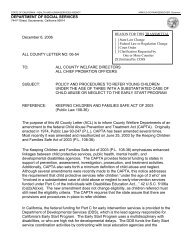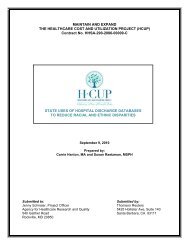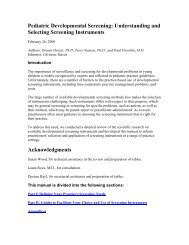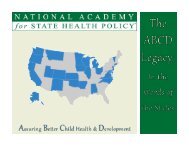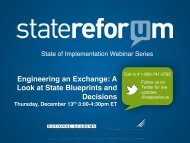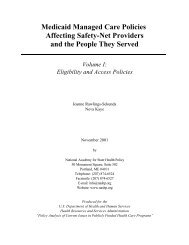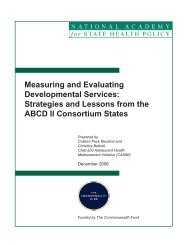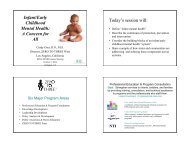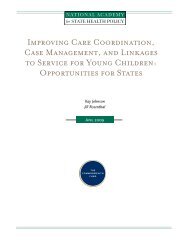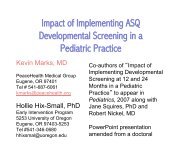Developing Federally Qualified Health Centers into Community ...
Developing Federally Qualified Health Centers into Community ...
Developing Federally Qualified Health Centers into Community ...
You also want an ePaper? Increase the reach of your titles
YUMPU automatically turns print PDFs into web optimized ePapers that Google loves.
• HRSA’s affiliation policies, which limit third-party involvement in the governance,<br />
management, and operation of FQHCs.<br />
• Federal Tort Claims Act coverage, which generally covers only FQHC services and<br />
sites within the approved scope of project and provided to the FQHC’s patients by its<br />
providers furnishing services within their scope of employment/contract (with certain<br />
limited exceptions).<br />
• Section 340B Discount Drug Pricing Program, which is available solely for<br />
outpatient prescription drugs provided to FQHC patients (as defined by the 340B<br />
program).<br />
• Preferential Medicaid and Medicare reimbursement, which generally is available<br />
only for services approved under the FQHC’s scope of project (although exceptions<br />
may exist based on a particular state’s Medicaid plan).<br />
• Federal anti-kickback safe harbor for FQHC grantees, which protects certain<br />
low-cost and no-cost arrangements among grantees and other providers, suppliers,<br />
and vendors that could otherwise implicate the federal fraud and abuse laws. 39<br />
The Affordable Care Act presents numerous opportunities for FQHCs and<br />
Primary Care Associations to assume new roles in the health care delivery system.<br />
<strong>Community</strong> networks led by FQHCs or Primary Care Associations could be an important<br />
resource for accountable care organizations or other integrated delivery systems,<br />
particularly for managing the treatment of patients who are dually eligible for Medicare<br />
and Medicaid, have complex conditions, or have social/behavioral health needs. As CMS<br />
and states develop ―risk-based payment models‖ as part of the Affordable Care Act or as<br />
part of state delivery system reform, FQHCs and Primary Care Associations may be<br />
uniquely situated to serve in an expanded capacity. To prepare for these new roles,<br />
FQHCs and Primary Care Associations will need to work together to demonstrate their<br />
ability to be financially competitive with other community providers, assume risk-based<br />
contracts, and demonstrate outcomes for an entire episode of care.<br />
CONCLUSION<br />
The creation of community-based networks to provide care management and greater<br />
access to health care services may enable states to hold down Medicaid costs while<br />
providing better care for beneficiaries. With 20 million more Medicaid beneficiaries<br />
being added to the rolls in 2014, states will be challenged to help already-strained<br />
primary care practices take on additional patients. Helping practices function more<br />
efficiently as medical homes—particularly for patients with chronic illnesses—can help<br />
improve access to high-quality care and control costs. In order for practices to function as<br />
32



